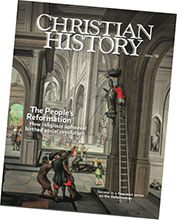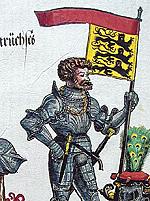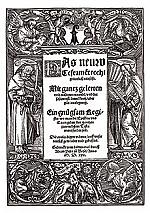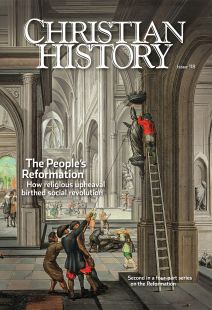Allies or Enemies?
From our vantage point 500 years later, Protestant reformers may all look the same: men and women fighting in one accord to birth a new church. But nothing could be further from the truth. In addition to his papal opponents, Martin Luther soon began to believe that his fellow reformers threatened true renewal of the church. Labeling them “false brethren” and “fanatics,” he fought like a tiger to preserve doctrine he believed God had revealed to him.
In, with, and under
The sharpest clash came over the meaning of the Eucharist. Swiss reformer Huldrych Zwingli interpreted Christ’s statement “This is my body” to mean “This represents my body.” He believed Christ was present in the sacrament “according to his divine nature.” Luther, however, insisted these words be taken literally: Christ explicitly promised he would be present in this sacrament, and the body and blood of Christ are really present “in, with, and under” the bread and wine and received truly by communicants. Luther believed that Zwingli’s understanding of the Lord’s Supper led to his followers’ rapid, even violent, changes in worship practices.
Behind this Sacramentarian Controversy, as people called it, lay the Karlstadt affair. Andreas Karlstadt (1486–1541), Luther’s senior in both age and tenure as a professor at the University of Wittenberg, had promoted Luther to the doctorate in 1512 and later collaborated with Luther and Philipp Melancthon in reforming the university’s curriculum (see “A motley, fiery crew,” pp. 43–48). Luther, however, soon overshadowed Karlstadt as a reformer. In 1522 he returned from seclusion in Wartburg Castle to find Karlstadt pushing radical reform. Karlstadt left town under pressure and resigned his academic and ecclesiastical appointments.
Order Christian History #118: The People’s Reformation in print.
Subscribe now to get future print issues in your mailbox (donation requested but not required).
On August 22, 1524, after a heated exchange at the Black Bear Tavern, Luther tossed a guilder (a common coin) at Karlstadt as a sign of open feud, daring him to publish his works on the Lord’s Supper. Karlstadt accepted the challenge, even after authorities expelled him from his pulpit for disturbing the peace. A pamphlet war between the two men followed.
Karlstadt anticipated many Anabaptist ideas (see “A fire that spread,” pp. 28–32): he rejected infant baptism, stressed the need for an adult conversion experience, declared the equality of laity and clergy, embraced congregational church polity, and viewed the Lord’s Supper as a memorial. During those years the visionary “Zwickau Prophets” also appeared, and revolutionary Thomas Müntzer (1489–1525) stirred up insurgent peasants in their war against landlords (see “They wanted God to save his own,” pp. 19–21).
Luther began to regard Karlstadt and all those who held radical views as threats to orderly reform of the church. In the end Müntzer was hunted down and executed, the Zwickau Prophets were driven from Wittenberg, Anabaptists began to be persecuted and killed, and the authorities hounded Karlstadt from place to place. And in Luther’s mind, the relatively mainstream Zwingli represented more of the same.
In November 1524 Luther read a copy of a letter in which Zwingli said he admired Karlstadt’s boldness on the subject of the Eucharist and agreed with him that the bread and wine are symbols. Lutheran reformers soon responded, and the battle was joined. In later years Luther would call both Zwingli and Karlstadt willful liars, “sect leaders,” and “novices in the sacred Scriptures.”
“This Is My Body!”
All these verbal missiles concerned German lay leaders of Protestantism, especially Prince Philip of Hesse (1504–1567). He invited the leaders of the German and Swiss factions to meet in the beautiful city of Marburg to resolve their differences, so Protestants could present a united front against Catholics and against possible military action by Emperor Charles V.
On October 1, 1529, most of the principal reformers of Germany and Switzerland met—Luther, Melancthon, Zwingli, Bucer, and Oecolampadius. Agreement was reached on 14 of 15 points. But on the final question, the real bodily presence of Christ in the sacrament, the colloquy foundered.
When Zwingli put forth his interpretation, Luther emphatically quoted from the Vulgate (the Latin Bible): “Hoc est corpus meum!” (This is my body!). He wrote the words with chalk on the table-top and refused to accept any deviation. Oecolampadius’s countertext “The Spirit gives life; the flesh counts for nothing” (John 6:63) made no impression on Luther, who declared in exasperation: “Again and again the body of Christ is eaten, for he himself commands us so. If he ordered me to eat dung, I would do it, since I would altogether know that it would be to my salvation.” Later he snapped to Bucer, in words intended also for Zwingli: “It is evident that we do not have the same spirit.”
In the end both sides denied that Communion is, as they understood the Mass to be, a sacrifice. They also agreed communicants should receive both bread and wine. On the question of the Real Presence, they agreed to disagree, but proclaimed the sacrament as a divine gift of grace with a “spiritual benefit.”
Each theologian present signed the Confession. But soon after, each side asserted the other had yielded on the essential points. Luther insisted that no political alliance was possible without complete doctrinal agreement, and Melancthon opposed any further concessions to the Zwinglians because it might prejudice discussions with the Catholics. So the German reformation led by Luther and the Swiss reformation led by Zwingli went their separate ways.
Luther asserted, “One side in this controversy belongs to the Devil and is God’s enemy”; he accused his opponents of allowing human reason to intrude on the plain words of Scripture. On the other side, Zwingli resented Luther’s condescending tone. He felt the Wittenberg reformer had treated him “like an ass.” Thirteen years after Marburg, Luther was still complaining about Zwingli’s “Swiss dialect” and his (Luther thought) pompous insistence on speaking Greek at every opportunity. He declared, “Zwingli and Erasmus are nothing but wormy nuts that taste like crap in one’s mouth!”
Making friends and influencing people?
In contrast with Luther’s growing estrangement from the Swiss reformation, his relationship with English reformers remained warm (see “The accidental revolution,” pp. 39–42). He admired Robert Barnes (c. 1495–1540), burned at the stake and fondly called by Luther “St. Robert”; Bishop Hugh Latimer (c. 1487–1555), later a celebrated victim of Queen Mary’s persecution; William Tyndale, whose theological works often roughly translated or paraphrased Luther’s writings; and Archbishop Thomas Cranmer.
But Anabaptists were a different story. Luther, like many other leaders of reform, lumped all radicals into one category. He routinely denounced the unsystematic Karlstadt, the mentally disturbed Müntzer, and the fanatic Melchior Hoffman, lumping them all with the peaceful followers of Menno Simons (1496–1561). He wrote: “The Anabaptists have written nothing against me because they have no learned men nor any eminent men. They are only a seditious mob.”
In the beginning of the Reformation, Luther disapproved of Zwingli’s persecution of Zurich Anabaptists. However the appearance of many radicals and the Peasants’ War alarmed him. By 1531 he supported death for blasphemy, under which he included “false teaching,” thereby condemning the Anabaptists’ rejection of the Apostles’ Creed and their refusal to participate in war or serve as magistrates.
In 1536 Melancthon drafted a memorandum on the treatment of Anabaptists which distinguished peaceful from revolutionary Anabaptists and demanded death for both. Luther signed the memo, although late in life he returned to his earlier belief that banishment or imprisonment was sufficient penalty for their crimes.
With few exceptions Luther’s reforming opponents did not repay in the same coin. They attacked his arguments, complained bitterly about his style, and accused him of violating Christian charity. But they still said they wished only to correct him where he had erred, not to reject his teaching entirely.
Melancthon, who took an occasional rebuke from Luther himself, remained true to his leader. He delivered his funeral oration in 1546, saying, “Some by no means evil-minded persons have complained that Luther displayed too much severity. I will not deny this. But I answer in the language of Erasmus, ‘Because of the magnitude of the disorders, God gave this age a violent physician.’” CH
This article is from Christian History magazine #118 The People’s Reformation. Read it in context here!
Christian History’s 2015–2017 four-part Reformation series is available as a four-pack. This set includes issue #115 Luther Leads the Way; issue #118 The People’s Reformation; issue #120 Calvin, Councils, and Confessions; and issue#122 The Catholic Reformation. Get your set today. These also make good gifts.
By Robert D. Linder
[Christian History originally published this article in Christian History Issue #118 in 2016]
Robert D. Linder is Distinguished Professor of History at Kansas State University and author of The History of the Church (2002) and The Reformation Era (2008). A longer version of this article appeared in CH 39.Next articles
Not only what was believed but what was done
Reformers wanted to change behavior, not just doctrine
Jon BalserakThey wanted God to save his own
Had Luther argued only for spiritual changes? German peasants didn’t think so
Edwin Woodruff TaitPreachers and printers
A hot-off-the-press technology pushed the Reformation forward
Armin Siedlecki and Perry BrownTearing down the images
Raids on churches resulted in the destruction of countless works of art
Jim West







